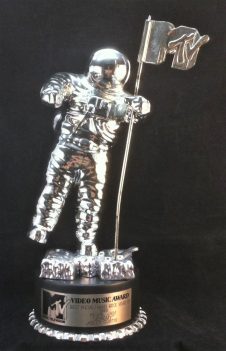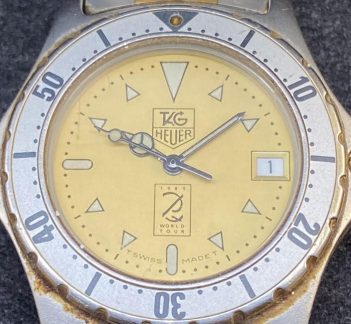Interviewed By Jimmy Steinfeldt
Los Angeles, CA (The Hollywood Times) 10/5/23 –
Jimmy Steinfeldt (JS): Rockaway Records has a Quality Pledge. How did that come about?
Wayne Johnson (WJ): Most dealers don’t grade properly. We’ve bought things off of eBay that say the item is in Near Mint condition and when it arrives, we find it’s in Poor condition. We like to keep our customers happy, so we are super strict on grading.
JS: Is your grading system one you came up with or is it an industry standard?
WJ: It used to be an industry standard 40 years ago but even then, we were stricter than most. If we have a record that looks like it MIGHT be near mint, we will call it VG++ to make sure our customers are happy. We almost never get complaints. The standards were really set by Goldmine magazine which was a bible of record collecting years ago. Early on Goldmine helped make us what we are. It moved us from collectibles being a hobby to being a business.
JS: How does the condition of vinyl affect prices?
WJ: Condition is everything. The gap in pricing between grades is widening. When we started the difference in price between Good and Mint was double or triple, today it could be 30-40 times. Good condition records are probably worth what they were 30 years ago while Near Mint condition could be worth 20 times as much.
JS: I noticed familiar names on your website because I photographed them over the years. Bowie, Rolling Stones, Pink Floyd, Motley Crue, Jeff Beck, John Fogerty, Pearl Jam, The Misfits.
WJ: Wow, all the collectible bands!
JS: I saw some great endorsements of your store on your website including by my friend Steve Resnick.
WJ: I’ve known Steve for 45 years. Have you been to his house? It is unbelievable! A Rock N Roll Museum.
JS: Oh yes, His cool dioramas, His collection of 45s, LPS and all formats. I also saw you had a nice endorsement from my agent Michael Ochs.
WJ: Oh yes, I’ve known Michael also for about 40 years. A great guy.
JS: I saw an endorsement also from Jeff Gold.
WJ: Jeff is one of the few people who started before us. One of the smartest guys in the business.
JS: Tell me about how you started.
WJ: It started by accident. My business partner is my brother Gary. In 1978 he was working at a local record store called Music Box in Fullerton. We both loved music and grew up with it. We knew nothing about collectibles. Gary heard about a swap meet that happened in the parking lot next to Capitol Records. It was the first Saturday of every month and I had no interest in going, I had no idea there was value in used records. I had been an electrician and T.V. repairman and I had gone to swap meets looking for parts for old T.V.s but never would have bent over to look at used records.
I found out that some records were selling for $100-200 and that amazed me. Me and Gary started going to swap meets and garage sales. There were no price guides, no internet and most records were 25-50 cents. We’d probably go to 30–40-yard sales on a weekend. I’d sometimes find Elvis 45s on the Sun label worth about $100 back then now worth thousands. The next month we went to the Capitol records swap meet and made $400. I thought 25 cents to make $100. I used to work two days repairing a T.V. to make $100. I think our second swap meet we made $2000. At this time, we ran the business out of my basement. Then we put an ad in Goldmine magazine and the phone rang off the hook from all over the world.
In the early days we bought a lot of junk. We learned as we went along and got smarter. In 1983 we bought our first record store, Rainbow Records. This was a very small store about 700 square feet, but we also did mail order. Within two years we outgrew that and moved into a 2000 square foot store. Two years later we bought our first building, an old bar about 3000 square feet. Before we even finished remodeling, I knew it was too small. I got tired of moving so then we bought our present building which is 10,000 square feet. It was actually too big but now we rent out much of it and it’s been a good investment. When we moved into this building it was the biggest record store in Los Angeles.
JS: When did your store become appointment only and why?
WJ: That was due to Covid when we were forced to close. We really accelerated our online business during this time and then we went to appointment only for our collector clients. Including Steven Tyler, Jimmy Page, Chris Robinson. We focus now on high-end collectibles. Today we don’t sell CDs or DVDs. Just the high-quality collectible records and other collectibles, posters and memorabilia. Our oldest records are from the early 50s, Doo-wop things like that and sometimes Pre-war Blues which are very rare. Today we focus more on Punk, Grunge, Metal as well as classic rock.
JS: The record industry has been a fixture in Los Angeles forever but even in my hometown of Minneapolis there was a lot of record retailing. It was the headquarters for Musicland, Lieberman, K-Tel and others. I knew these people and when I moved to L.A. I watched Tower and later Amoeba make their mark. Can you speak to the good old days of actual record stores?
WJ: Aron’s Records was my favorite store. They weren’t that much into collectibles. I could buy a collectible record there for $5 and sell it for $50. Then later I went to Amoeba in San Francisco, and it blew my mind.
JS: I love that store by Golden Gate Park.
WJ: That experience inspired me to expand our store. Amoeba is still a great store. They don’t come close to us in collectibles but as a music store they are the best in the world.
JS: What do you think I bought at Amoeba San Francisco for 25 cents?
WJ: 45 adapters?
JS: Yeh!!
JS: Did you ever become so attached to your rare records that it was hard for you to part with them?
WJ: No, I decided early on this was a business and what we bought we would sell. I was a huge fan of The Beach Boys and Brian Wilson. When I first started out getting records it was more like a hobby. I saw all these unique Beach Boys releases and I started to collect them for me. But soon I asked myself “Do I want this to be a business, or do I want to be a collector?” I did think maybe someday when I’m successful and have money I can collect again but it turns out I don’t need that stuff for myself anymore. I got to know Brian Wilson. He would call me when he wanted some things. This experience and meeting so many other people convinced me these material things don’t mean that much to me anymore. People say to me all the time you must have an amazing collection and I say “Yeh, it just changes every day, the store is my collection.” Of course, the actual music is still as important as ever.
JS: What do you think of the vinyl revival?
WJ: When it started maybe 15 years ago, I thought it’s not gonna last, it’s a fad. I’m so glad I was wrong. Vinyl sales keep going up and of course now outsell CDs. The amount of money people are paying now for even new vinyl is amazing. It used to be things had to be old to have value. A year ago, Paul McCartney put out a $600 box set of 45s limited to about 3,000-4,000 copies. It sold out instantly and a month later they are worth $1,500-$2,000.
JS: What about the Rolling Stones Some Girls stuff.
WJ: I think that was the last great album the Stones made. Anything from Some Girls is so collectible. A little countertop display that I used to sell for $100 I sold two in the last year for $800 each. The big display piece is like $3,000. This set of 5 posters, because it was in the best condition I’ve ever seen, sold for $20,000.

JS: Any bands from my hometown Minneapolis that have become very collectible.
WJ: Prince obviously. Super collectible. Most expensive CD I ever sold was the black album for $13,000.

One of the coolest things I’ve sold recently is the MTV award. I bought a collection of 50-60 gold record awards and other cool things. I was wrapping up things and getting ready to go to my car when the seller comes out with the moon man statue and asked me if this was worth anything. I paid him $10,000 for it.
JS: Tell me about the Pink Floyd watch.
WJ: I think it’s really cool because they gave out very few and I believe it’s a pretty expensive watch by Tag Heuer. Only important crew members got one.

JS: Any final thoughts?
WJ: Jimmy, one last thought is if you or your readers know anybody who wishes to sell their collectibles, we pay more than most dealers for high quality collectibles. Some people think if they sell to a dealer they won’t get as much as if they sell it on their own. Turns out it’s not that easy to sell valuable collectibles on your own for top price.
A few years back a guy had a rare Beatles 45, I offered him $2,000 for it. He said “No, I’ll sell it on eBay.” He put it on eBay auction. I bid $2,000 and ended up getting for $350 because nobody bid against me. Sometimes not even big auction houses realize what they have or don’t promote it properly. I bought a belt buckle owned by John Lennon at a major auction for $4,000 and sold it for $15,000. So, if you have collectibles to sell contact us https://www.rockaway.com/




